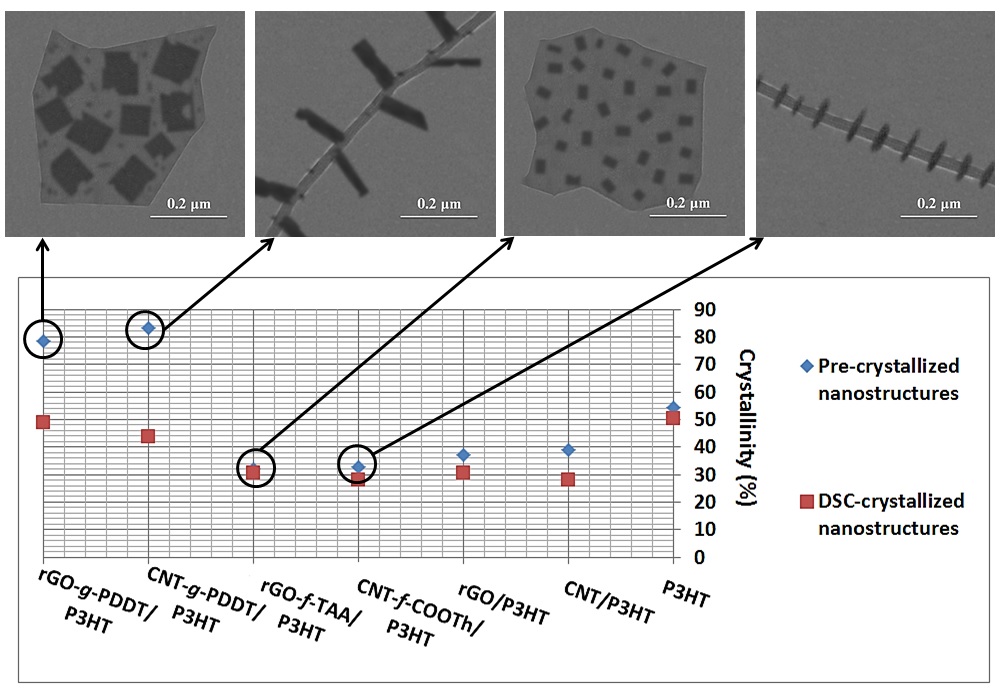Fri, Dec 13, 2024
[Archive]
Volume 17, Issue 2 (June 2020)
IJMSE 2020, 17(2): 42-53 |
Back to browse issues page
Download citation:
BibTeX | RIS | EndNote | Medlars | ProCite | Reference Manager | RefWorks
Send citation to:



BibTeX | RIS | EndNote | Medlars | ProCite | Reference Manager | RefWorks
Send citation to:
Agbolaghi S. Confined/Unconfined Crystallization of Poly(3-Hexylthiophene) in Melt/Solution Environments Containing Carbonic Materials and Correlated Thermal and Structural Behaviors. IJMSE 2020; 17 (2) :42-53
URL: http://ijmse.iust.ac.ir/article-1-1495-en.html
URL: http://ijmse.iust.ac.ir/article-1-1495-en.html
Abstract: (10998 Views)
Confined and unconfined crystallizations of poly(3-hexylthiophene) (P3HT) were studied in the solution-grown supramolecules and melt-grown systems using a differential scanning calorimeter. The carbon nanotube (CNT) and reduced graphene oxide (rGO) and their functionalized (CNT-f-COOTh and rGO-f-TAA) and grafted (CNT-g-PDDT and rGO-g-PDDT) derivatives were employed to develop the samples. The absorbance, structure details via Scherrer formula, fusion enthalpy (ΔHm) and crystallinity (Xc) were measured in two distinct confined/unconfined crystallization environments. Although the functionalized-CNT/rGO precursors partially reduced the crystallite qualities with respect to the pristine CNT and rGO ones in the solution-grown supramolecules, they did not affect the structural properties in the melt-grown samples. Grafted carbonic materials could be considered as appropriate seeds for the arrangement of P3HTs in both solution and melt crystallizations. The best absorbances, larger and more compact crystals, and higher melting point, ΔHm, and Xc values were recorded for the pre-developed CNT-g-PDDT/P3HT stem-leaf (6.09–22.51 nm, 3.52–13.89 Å, 239.8 °C, 30.86 J/g and 83.40%) and rGO-g-PDDT/P3HT coarse-patched (5.96–20.76 nm, 3.57–13.95 Å, 237.6 °C, 29.13 J/g and 78.73%) supramolecules. Although the melt-grown CNT-g-PDDT/P3HT (201.4 °C, 215.3 °C, 16.22 J/g and 43.84%) and rGO-g-PDDT/P3HT (205.4 °C, 218.8 °C, 18.06 J/g and 48.81%) nanostructures were not as perfect as the respective solution-grown nano-hybrids, they were well-arranged with respect to the CNT/P3HT, CNT-f-COOTh/P3HT, rGO/P3HT and rGO-f-TAA/P3HT samples
Type of Study: Research Paper |
Subject:
Ceramics
Send email to the article author
| Rights and permissions | |
 |
This work is licensed under a Creative Commons Attribution-NonCommercial 4.0 International License. |







